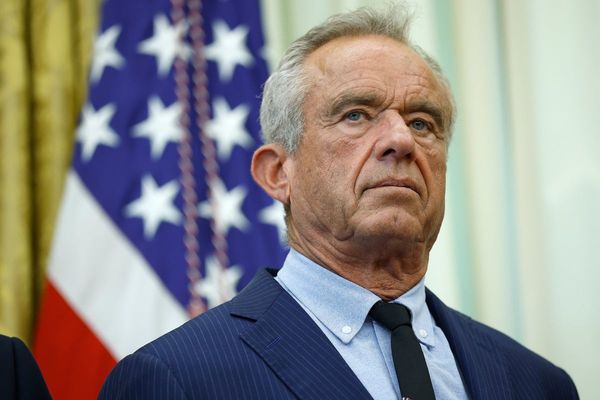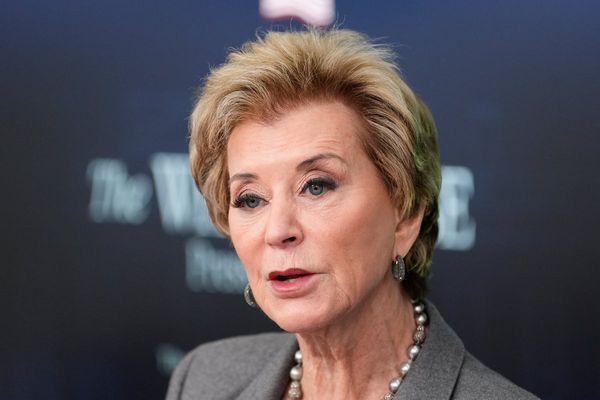
Ukraine and Germany have agreed to future military cooperation in which Berlin will help finance long-range weapons production on Ukrainian soil.
The deal came as Zelenskyy warned that Russia had amassed 50,000 troops in the Sumy region bordering Russia, where Vladimir Putin has declared an intention to establish a buffer zone.
Friedrich Merz, the German chancellor, said the weapons would be produced in a Kyiv-Berlin collaboration. “Our defence ministers will sign a memorandum of understanding today regarding the procurement of Ukrainian-manufactured long-range weapons systems,” Merz told a press conference.
“There will be no range restrictions, allowing Ukraine to fully defend itself, even against military targets outside its own territory.”
The pact was forged as Zelenskyy arrived in Berlin in search of more support after Russian attacks intensified, and amid evidence that Moscow was planning a broad summer offensive. It was his third visit to the German capital since the start of the full-scale invasion in 2022 and his first since Merz entered office.
Merz avoided commenting on speculation as to whether Germany would deploy Taurus missiles, which was prompted by his pronouncement that range restrictions were no longer in place, enabling Kyiv to strike Russian military targets over the border.
Neither leader would detail the specific weapons that would be manufactured in Ukraine, saying it was prudent to keep the information as secretive as possible.
Zelenskyy said he expected the first weapons to be ready by June 2026.
The expectation is that Berlin will supply Ukraine with the technical components to build and maintain its own long-range weaponry, including rockets and cruise missiles, with a range of up to 2,500km. This could enable Kyiv to better defend itself, and also save Berlin from accusations – at home in particular – that it is a war monger, helping to placate sceptics within elements of Merz’s government who fear Germany being dragged into a wider-scale conflict.
The two leaders said they believed all the stops had been pulled out to solve the conflict through diplomatic means, repeatedly emphasising their conviction that the Russian president, Vladimir Putin, was not interested in ending the bloodshed. But they said they would continue to pursue a negotiated peace, referring to possible talks in Geneva.
Germany has long supported Kyiv and is the second-biggest deliverer of weapons after the US, but relations between Zelenskyy and Merz’s predecessor, Olaf Scholz, often felt decidedly cool, and Kyiv was evidently repeatedly frustrated by the speed of Berlin’s decisions.
Merz said while in opposition that he would back Ukraine in office, and Wednesday’s meeting was noticeably warmer and less tense than those between Scholz and Zelenskyy. The two leaders used the informal version of “you” to address each other, as well as referring to each other by their first names. When Zelenskyy’s microphone appeared not to be connected to the in-house interpreter, Merz quipped “German technology”, and laid a supportive hand on the Ukrainian president’s arm.
As well as focusing on Germany’s continued support for Ukraine, the visit was also expected to be used to discuss efforts to bring about a ceasefire in the conflict that has run for three-and-a-half years, the German government spokesperson, Stefan Kornelius, said earlier in the day.
Almost immediately on entering office earlier this month, Merz took a train to Kyiv with his French and British counterparts, Emmanuel Macron and Keir Starmer, as a sign of their solidarity towards Zelenskyy.
He greeted Zelenskyy on Wednesday in a rainy Berlin with a military parade outside the chancellery building.
After meeting German business leaders and leading parliamentarians, Zelenskyy will spend the night in Berlin. He and Merz are then due to travel to the western German city of Aachen on Thursday, where the European Commission president, Ursula von der Leyen, is to receive a prize. Starmer is also due to attend, and the four leaders are expected to hold further talks there.
Before the Berlin encounter, Russia’s foreign minister, Sergei Lavrov, called Merz’s recent plans to build the strongest conventional army in Europe “very worrying”. Speaking at a security conference in Moscow, Lavrov said the announcement was reminiscent of “the periods of the previous century when Germany twice became the leading military power and how much trouble this brought”.
There has been heightened speculation that Merz will promise to deliver longer-ranged weapons systems to Ukraine, such as Taurus missiles, after he said on Monday there were no longer any range restrictions on the weapons Germany sends to Kyiv to defend itself against Russia.
However, the German government has since sought to clarify its position, saying these range restrictions had already been lifted.
Merz is expected to offer his Ukrainian counterpart a multibillion-euro package including additional air defence capabilities, more weapons and financial aid with which Ukraine can buy US military equipment. It is unclear whether the package will be in addition to the €3bn (£2.5bn) in aid already agreed in March by the outgoing government.
There are also expectations that a longer-term approach to helping Ukraine will be adopted. This would probably include Berlin supplying Ukraine with the technical components necessary to build and maintain its own long-range weaponry, including rockets and cruise missiles. This would enable Kyiv to defend itself more effectively without Berlin having to be concerned about being labelled a “war monger”. This in turn would make support for Ukraine more palatable to Merz’s domestic audience, among whom there is concern about Germany being dragged into a wider-scale conflict.







